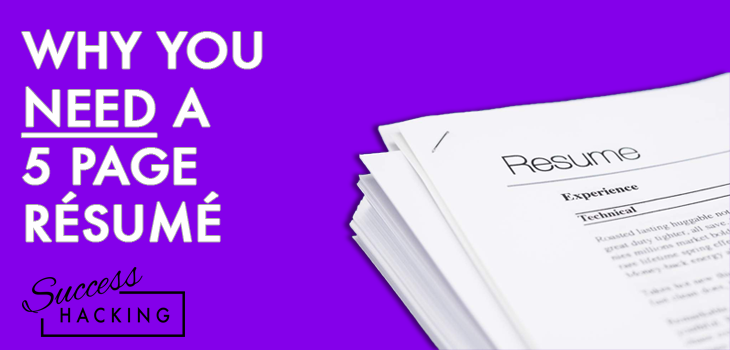
“You MUST keep your résumé to 1 page…unless you’re going for an executive level position.”
It’s advice people hear so often that they don’t even question it. They work themselves ragged for days or weeks at a time, tweaking and trimming, shifting margins by a fraction of an inch, and adjusting their word choice to choose shorter words when they find that a single word has snuck onto the next line.
It’s also complete and utter CRAP!
And here’s why…
The Artist vs. The Accountant
We’re all of two competing minds. I call them The Artist and The Accountant. (Which coincidentally also sounds like the worst Aesop’s Fable in the world)
The Artist knows no bounds, cannot be reigned in and creates for the sake of creating. This is the side of us that insists that we write terrible poetry for our first, young loves. (Or was that just me?) The Artist exists in that feeling of flow you have when you’re on a roll with something and can’t be stopped.
It is the most animal, the most aspirational side of us, but it’s slowly quashed throughout our lives as people tell us all the things we CAN’T do. We can’t be an astronaut, we can’t go to school in a superhero costume, we can’t, we can’t we can’t. And that’s when we’re introduced to The Accountant.
The Accountant is that little voice in our heads we wish we could tell to shut up. It draws strict lines around things, forces us into boxes, makes us play by the rules, and reminds us that there are limits. The Accountant is the mind we have when making a big purchase. We need to make sure we don’t overspend, so careful consideration is required.
…and because of that nobody likes The Accountant. He’s basically that annoying little kid in class who always says he’s going to tell the teacher what you did. That kid is not popular, and he definitely doesn’t easily get offered jobs.
The Artist on the other hand, with his passion and boundless ideas, is a very intriguing person. People like being around him, it’s the side of us our friends and family know, which makes him infinitely more interesting and infinitely more hirable.
When people arbitrarily force a page limitation on their résumés, they are stifling their inner Artist, and by extension, removing some of the qualities that would make people actually give them a job.
It’s no surprise, then, that what is widely considered to be the first résumé was created by someone we more often associate with art: Leonardo da Vinci.
But…
Some of you are still thinking, “But, Nick, that all sounds well and good, but I NEED to keep my résumé short!”
WRONG!
Let’s take a step back from jobs and think about this in terms of a contest.
Pretend there were two sweepstakes where you could win a trip. The first prize package told you all about the amazing shopping experiences you could have, the 5-star dining experiences, the world-class museums, and the luxury hotel you’d be staying in. The second package on the other hand told you, “A trip worth up to $1500.”
Which one would you want more?
If you take more than 1 second to say the first one, I will come to your house and hit you in the back of the head.
Why is that? They could actually be describing the exact same trip, but one is driven by aspiration and the other is grounded by its limitations.
The same thing is at play when you force your work history and your successes into a narrow cage, it undersells you.
The Solution
The fix is relatively simple: let loose. If you have amazing successes in your past, write about them. Forget thinking about what you think you should say, and instead focus on what they want most. Then write ALL of your ideas down in as many pages as it takes. And if it takes 5, 10, 20 pages or more? Awesome!
Don’t worry about word count or formatting or font! Right up front you don’t want to be burdened with that, it’s only going to cause you to sell yourself short.
Instead of trying to keep your résumé short, I would encourage you to see just how long you can make it. If you really have that many amazing accomplishments to list, they deserve to be seen!
Write every one down.
Then…
After that, then and ONLY then should you worry about trying to pair it down. But rather than doing it arbitrarily, use your new ULTRA RÉSUMÉ like a word bank.
When you find a job to apply to, you don’t have to worry about hoping your résumé will fit the bill. You can actually make a custom résumé on the fly and know it will be the perfect one for this position. All you have to do is copy and paste only the successes and accomplishments from your past that best sell you for this particular job.
The résumé you send out will be this shortened one, not the full dossier. And if it’s over 1 page? That’s great!
Because you started from a limitless place, you will know that these are your best selling points and every one will be justified. So if you hit 2 or 3 pages? That just means you have more selling points than the average person and can actually help you get a job.
So let your inner Artist loose and let me know how it goes!
And feel free to use the comments to share any résumé horror stories you have, because let’s face it: we all hate writing them.
PS: If you’re visiting from Recruitment Queen, welcome! Drop into the comments, introduce yourself, and have a look around. There’s lot’s more content to be found here for people looking to jumpstart their job hunt.

I absolutely agree! Journaling your top 10 success stories is the first homework assignments private clients get. Before even critiquing a resume I need to know what each client considers their top skills, interests and areas of knowledge.
As I teach in my classes…resumes don’t get jobs people do! People who have taken not only the time to write their success stories, but those who have learned how to network and share their stories, will find work more quickly than sending out 100 resumes!
I will add your blog as required reading for my clients. Thx for sharing. Liz
Top 10? That’s fantastic! Most people find writing 4 to be a challenge, but the more they have, the better prepared they’ll be to position themselves.
Hi, Nick!
I find your articles interesting and a welcome change from the restrictive articles that get clients completely bound up by exact rules for resume writing. So often when I first start working with a client they are concerned about the length of their resume and fixated on some small detail that they read somewhere in an article about how to write the perfect resume. The resume is important – but it’s not going to get you the job. A lot of my work centers on working on their mindset, confidence and what’s really holding them back in their career transition. 9 times out of 10, it’s NOT their resume! It’s what’s going on in the back of their mind that’s holding them back from effectively doing what they need to do to make a change. I intentionally do not speak on the resume topic unless it’s part of a full outplacement workshop when I have speaking engagements because people are already too focused on it when what’s really keeping them from success has nothing to do with their resume. Yet, job seekers will relentlessly tweak their resumes especially when they start getting nervous instead of using their time and energy on things that actually will make a difference. Nicely done!
This comment should be required reading for career coaches and job seekers everywhere.
Thank you so much for your kind reply, Nick! I have to apologize that somehow I missed it and just came across it here. I wish you much success as you continue to share your insights and experience and deeply appreciate your response to my comment. It’s a pleasure to connect with you here!
It seems that many of the commenters on LinkedIn are “The Accountant” and they’re missing the point. Part of the professional resume writing process is to teach clients to realize and embrace their value to potential employers. Any salesperson can tell you that you can’t sell a product you don’t believe in. Your exercise is brilliant.
When I work with clients, I create for them a “master document” similar to what you’re describing. Unfortunately, many of my clients are either not creative / motivated enough to pull it off, OR are sold on the advice (fear mongering) of the L. Robbins and J. Sullivans of the world. But for those who are open to the adventure, it’s extremely rewarding.
Great article, Nick.
Thanks for this Nick,
I particularly like the way that you have addressed both issues, namely the need for a shorter CV that people will acually read as the need for expression.
Thanks